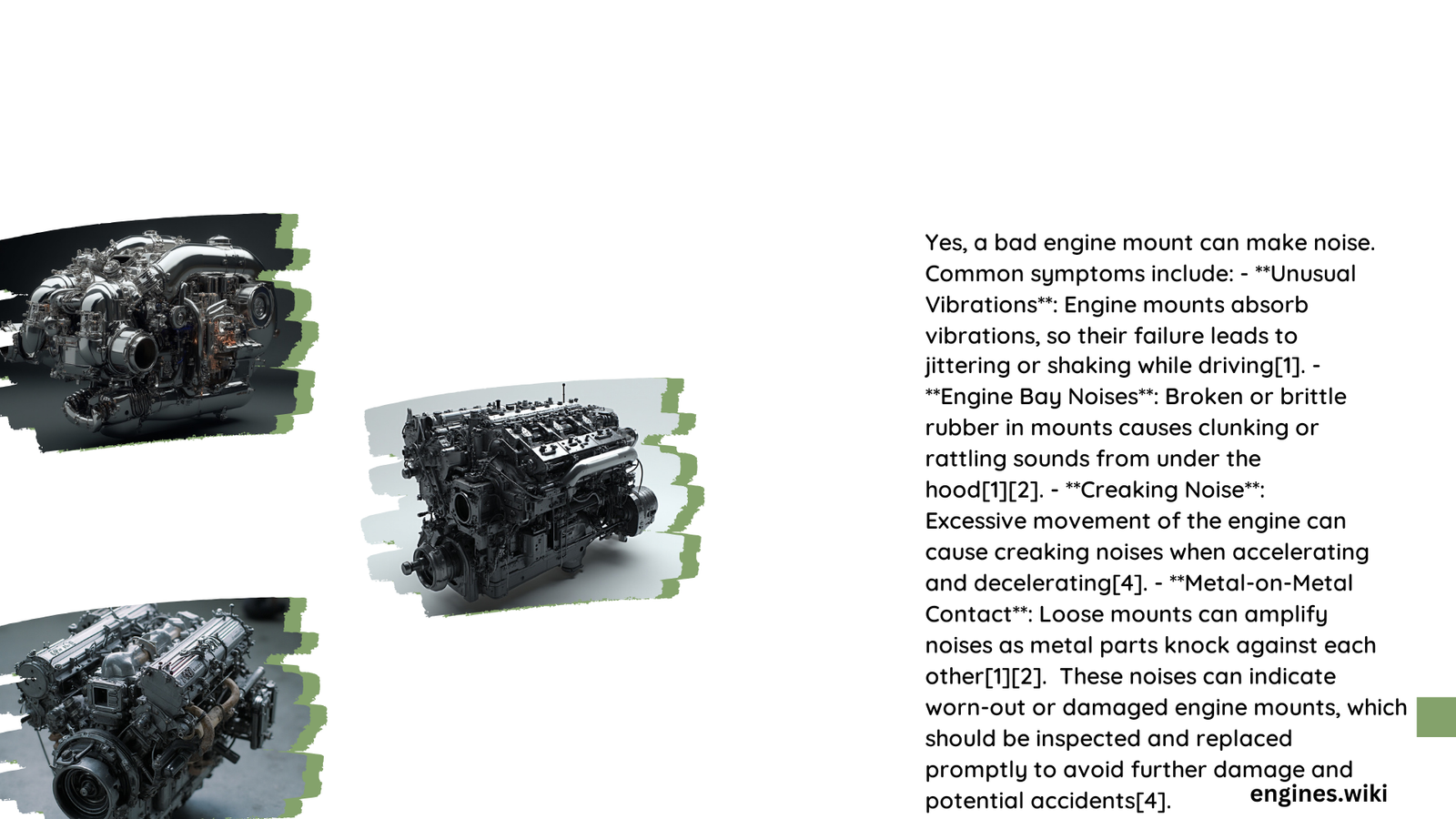Engine mounts are critical components that support and stabilize your vehicle’s engine, absorbing vibrations and reducing noise. When these mounts deteriorate, they can produce various sounds ranging from subtle rumbling to loud mechanical noises. Understanding the relationship between engine mounts and noise is essential for maintaining your vehicle’s performance and preventing potential mechanical failures.
What Causes Engine Mount Noise?
How Do Different Engine Mount Types Produce Noise?
Engine mounts come in three primary variations, each with unique noise characteristics:
- Rubber Mounts
- Most common mount type
- Noise level: 70-90 decibels
-
Typical symptoms:
- Rumbling vibrations
- Increased body panel resonance
- Noticeable during acceleration
-
Hydraulic Mounts
- Liquid-filled damping system
- Noise level: 80-95 decibels
-
Characteristic sounds:
- Knocking
- Fluid sloshing
- Sudden vibration changes
-
Electronic Active Mounts
- Advanced technology with sensor integration
- Noise level: 70-100 decibels
- Unique noise patterns:
- Intermittent vibrations
- Electronic signal-related sounds
What Are Common Mechanical Failures Leading to Noise?
| Failure Type | Noise Characteristics | Potential Consequences |
|---|---|---|
| Rubber Degradation | Low-frequency rumbling | Increased engine movement |
| Fluid Leakage | Sudden sharp sounds | Reduced vibration dampening |
| Structural Misalignment | Rhythmic thumping | Uneven engine positioning |
How Can You Diagnose Engine Mount Noise?
Diagnostic Techniques
- Visual Inspection
- Check for visible cracks
- Examine rubber integrity
-
Look for fluid leaks
-
Vibration Testing
- Use specialized vibration analyzers
- Observe vehicle behavior during different driving conditions
-
Monitor RPM-related vibrations
-
Sound Analysis
- Listen for unusual noises
- Identify noise frequency and intensity
- Correlate sounds with specific driving scenarios
What Are Replacement Costs and Timeframes?
Estimated Costs and Labor Time:
– Rubber Mount Replacement
* Cost: $100-$300 per mount
* Labor time: 1-3 hours
- Hydraulic Mount Replacement
- Cost: $200-$500 per mount
-
Labor time: 2-4 hours
-
Electronic Active Mount Replacement
- Cost: $500-$1,000 per mount
- Labor time: 3-5 hours
When Should You Replace Engine Mounts?
Key indicators for replacement include:
1. Persistent vibrations
2. Increased engine movement
3. Unusual noises during acceleration
4. Visible physical damage
5. Reduced vehicle handling performance
Expert Recommendations

Professional mechanics recommend:
– Regular visual inspections
– Addressing noise issues promptly
– Using high-quality replacement mounts
– Following manufacturer-recommended maintenance schedules
Preventive Maintenance Tips
- Avoid aggressive driving
- Maintain proper engine alignment
- Use quality motor mounts
- Perform periodic professional inspections
Final Thoughts
Understanding engine mount noise requires careful observation and professional diagnosis. While some sounds might seem minor, they can indicate significant mechanical issues that could compromise your vehicle’s performance and safety.
Reference:
– Febi Blog on Engine Mounts
– Mercedes-Benz World Forums
– Lexie Hearing Decibel Examples
